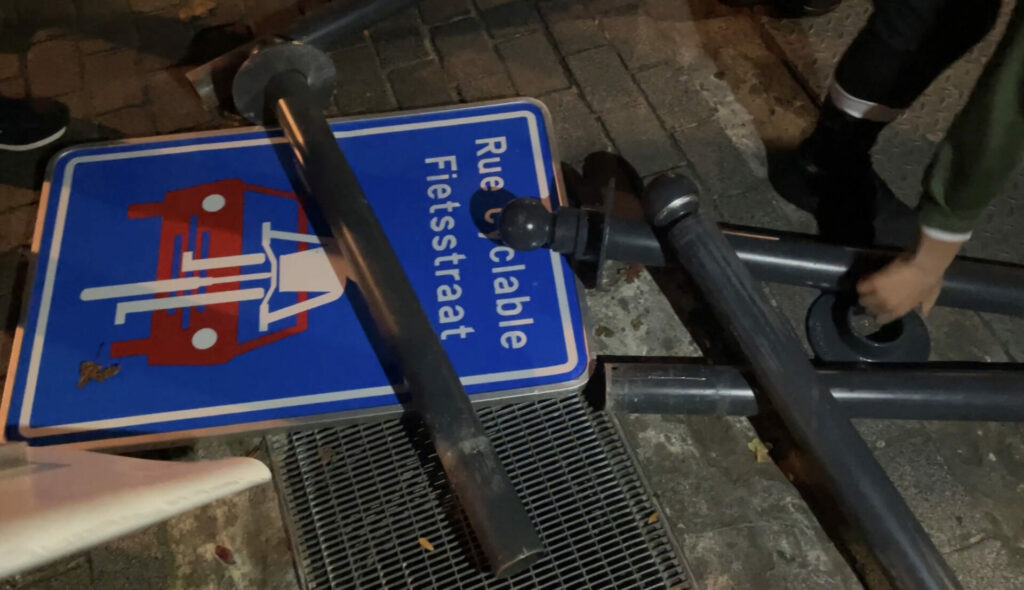The recent aggressive protests against the new Good Move circulation plan in the Brussels municipality of Schaerbeek may have been shocking in their violence, but angry campaigning against mobility plans is by no means new.
There is a long history of extreme opposition to the changes in the traffic situation in Belgian neighbourhoods with people claiming that their freedoms have been curtailed, among other grievances.
"We can no longer get where we want with our car," claim some. "It is bad for trade" or "it causes problems for suppliers" state others while complaints such as "there are fewer spaces to park" or "it is bad for accessibility" are also aired. These and other annoyances are often voiced when radical mobility plans are announced or introduced.
But are circulation plans, new shopping streets or new tram lines really such a bad thing?
"All central cities in Flanders have circulation plans, speed limits and bicycle streets," said mobility expert Dirk Lauwers from Ghent University. "In established politics, there is a fairly large consensus that one should still go in that direction: to make our cities car-free, safer and provide more space for cyclists."
Is driving true freedom?
A number of motorists view these plans with displeasure. "People still connect the car with a sense of freedom, and the car industry responds to this, while in reality you are very often stuck in traffic jams," said Lauwers. "So, it is often not the freedom provided by driving that you see in the commercials."
The recent protest in Schaerbeek is not unique. Five years ago, for example, a fierce protest against the introduction of a radical circulation plan in Ghent was organised. Local traders in particular feared that their turnover would plummet because they fear the city was in danger of becoming unreachable.
Jos Vermeiren of the East Flanders chapter of the UNIZO business association said that too little had been done to inform the residents before the Ghent plan was brought in, adding that the authorities had underestimated the impact it would have on residents and entrepreneurs.
"The communication could have been much better,” he said. “There was a strong feeling that something was being imposed dogmatically from above."
Learning from Ghent
Surveys by UNIZO show that in the first phase after the introduction of the Ghent circulation plan, many traders did indeed lose turnover by 10 to 30%, but this effect has now levelled off: today, the city looks nicer and cleaner and the inaccessibility that many initially feared has not proven to be so problematic.
"Ghent is not unreachable, on the contrary," said Vermeiren. "Ghent is and remains a fantastic city to visit with a great mix of activities for an evening or weekend away. But for a long time, Ghent was saddled with a perception problem: restoring trust takes a lot of time."
"Everyone is in favour of road safety," Lauwers explained. "When introducing measures, people are often negative. But people who are critical usually become more positive over time, because in the end they also see the benefits."
Related News
- Good Move protests: Schaerbeek reopens talks with residents
- Belgium in Brief: Can business continue without cars?
Other complicating factors in these discussions are groups that have been organising themselves via social media, especially since the Covid-19 pandemic. For them, traffic has become a point of contention in a fight against "the government," much like the struggle of the farmers in the Netherlands or that of the Trump supporters during the storming of the Capitol in Washington.
Violence is not shunned on social media but is sometimes encouraged as a means to an end, which is why the dissatisfaction of the opponents of these circulation plans must be taken seriously. "The way in which the plans are implemented can be abrupt," said Lauwers.
Consultations in advance should be held a lot more and the 'why' behind certain plans should be better explained to those involved, according to him. "But there is also such a thing as political polarisation, and the radicalisation of protest movements which is, of course, a fundamental social issue."

